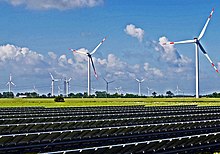Applied Science AQA/Generation of Energy
Generation of Energy
[edit | edit source]Setting Applied context
[edit | edit source]
Many people are concerned about the environmental problems caused by traditional methods of producing electricity and by the potential dangers of nuclear fuels. These concerns have given rise to the use of alternative methods for the generation of useful energy.
| Syllabus Content | What you need to do |
|---|---|
| the generation of useful energy through the use of a range of different sources, such as:
• fossil fuels • nuclear fuels renewable fuels such as: • solar power (both heat and light) • wind power • wave power • tidal power • traditional hydroelectric power • geothermal sources • biomass |
Know how electricity is generated from each of these resources.
Include consideration of energy transfers, as well as sources of inefficiency. (Questions on this topic can also include parts on efficiency, kinetic energy (e.g. of wind or water) and GPE (e.g. related to the height of falling water). |
| • the advantages and disadvantages of these sources and their suitability for use in a range of contexts | Be able to compare the different resources e.g. in terms of renewability, cost, pollution... |
Exploration of key ideas
[edit | edit source]Fossil Fuels
[edit | edit source]
Oil, coal and gas formed from organisms that lived millions of years ago. Now we can extract them from the earth and burn them to release energy.
Production - compare the main parts of power stations. What are their main areas of inefficiency?
Renewability - find out when each type is expected to run out.
Pollution - explore the effects of CO2 and SO2 production.
Topical Issues - what is 'fracking'? Do you think it is a good idea?
Nuclear Power
[edit | edit source]A nuclear power station doesn't produce CO2 while it's running, but there are big issues after the power station has reached the end of its life.
Waste disposal - what are the issues with nuclear waste?
Decommissioning - why is demolishing an old nuclear power station an expensive business?
Renewable Resources
[edit | edit source]The advantage of renewable resources is that they won't run out (in human timescales) but they each have significant limitations:
Solar power - when isn't it available?
Wind power - why is it unreliable?
Wave power - why is its use restricted?
Tidal power - what limits its availability?
HEP - what are its effects on the environment?
Geothermal sources - why can't we all use them?
Biomass - what problems do they share with fossil fuels?
Contexts and Comparisons
[edit | edit source]One important aspect of this topic is the realisation that different energy resources are useful in different places and at different times - and so a combination is often a good solution. You could look and see what the mix of energy resources in the UK is like currently.
You need to be able to compare different aspects of different types of energy resources e.g. why a coal power station has a much lower efficiency than a solar farm.
Study Task
[edit | edit source]Choose two of the energy resources and compare their advantages and disadvantages in a table like this:
| Advantages | Disadvantages | |
|---|---|---|
| Wind Power | ||
| Nuclear Power |
Consider issues such as renewability, cost, pollution, efficiency...
Careers and Organisations
[edit | edit source]Carry out some research into these jobs in the energy industry. (Feel free to add other jobs you find.)
| Research these roles: | What are the benefits of this role to society? | What organisations would employ someone in this role?
(Where would they work?) |
What would someone in this role have to do within the organisation? | What scientifically-related skills do they need to have?
What techniques do they need to have mastered? |
What experience is needed to undertake this role and its responsibilities within an organisation? | What other science personnel will they work with in their organisation. |
|---|---|---|---|---|---|---|
| Wind Turbine Technician | ||||||
| Electrical Field Engineer |
Relevant practical/s
[edit | edit source]– relating to criteria skills
Quick questions
[edit | edit source]Example:
List the energy resources above in order of their "start up" times.
click to reveal the answer
Exam-style question
[edit | edit source]6 A farmer on a remote Scottish island decides to install electric power to his house. The cost of installing a mains power line is very high. He has considered solar photo-voltaic
cells but he is concerned that they have an efficiency of only 8%.
6 (a) Explain what is meant by an efficiency of 8%. (2 marks)
6 (b) Other than efficiency, give one advantage and one disadvantage of generating electricity from solar photo-voltaic cells. (2 marks)
6 (c) Suggest three other ways the farmer might generate electricity using renewable sources of energy. (3 marks)
6 (d) Why are we being encouraged to use renewable sources, rather than fossil fuels, to generate electricity? (2 marks)
6 (e) Give two reasons why we still produce most of our electricity from fossil fuels. (2 marks)
6 (f) Give one disadvantage of using nuclear fuel as a source of energy. (1 mark)
M/Jun10/SC02
click to see the answer to the exam question
Links
[edit | edit source]UK Office for National Statistics gives an overview of our energy usage. [1]
to other sections within this book
to good external websites (including AQA website, Wikipedia, relevant applications / companies) - also considering links in spec
References / Bibliography
[edit | edit source]of recommended text books
including mapped refs to existing books
